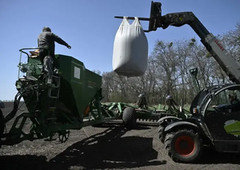Russia seeks to legitimize land seizure in Ukraine through mapping project

Amid ongoing battles, Moscow turns to maps and paperwork to assert control over Ukraine's occupied farmland.
Even as artillery fire echoes through eastern Ukraine, the Kremlin is laying bureaucratic claim to land belonging to Ukraine.
Russia's Ministry of Agriculture has announced a 450 million RUB ($5 million) tender to map farmland in Ukrainian provinces that it partly occupies. Officials say the goal is to integrate this territory into the Russian administrative system. But much of the land remains under Ukrainian control, and accurate cadastral records are either missing or outdated.
The mapping will be carried out amid active combat, using satellite imagery, pre-2002 Ukrainian land data and open-source information. Producing official land documents, the Kremlin aims to legitimize its territorial claims through paperwork rather than through presence.
Food terrorism
Russia's war in Ukraine has gone far beyond conventional combat. Analysts increasingly describe it as hybrid warfare fought with missiles but also with economic disruption, infrastructure damage and control over agriculture.
"This is not just a war for land. It is the systemic destruction of key elements of the country's economic sustainability -- and agriculture is at the forefront here," Pavlo Koval, general director of the Ukrainian Agrarian Confederation, told Kontur.
Before 2022, Ukraine was a major player in the global food market. Its agricultural exports fed an estimated 400 million consumers worldwide and accounted globally for 9% of wheat, 14% of corn and 46% of sunflower oil exports.
As Russian forces occupied parts of southern and eastern Ukraine, they moved quickly to seize agricultural infrastructure, controlling land, supply routes, and storage and processing facilities.
"What we are seeing is a well-thought-out tactic. Russia is using food as a strategic weapon against both Ukraine and countries that depend on Ukrainian exports," said Koval.
He described the campaign as a deliberate effort to cripple Ukraine's economy, not a random land grab.
"It is an attempt to destroy the Ukrainian economy systematically, deprive the country of one of the most important sources of foreign currency and destabilize the world market," he said.
These tactics are already harming global supply chains and increasing the risk of a food crisis, especially for countries with vulnerable economies, according to Koval.
International analysts increasingly describe Russia's actions as "food terrorism," in which the Kremlin targets agricultural infrastructure and uses food exports as tools of pressure and coercion.
International law violation
Changes to property rights in Russian-occupied territory violate international humanitarian law -- specifically the Fourth Geneva Convention -- and are not recognized by Ukraine or the international community. Any "re-registration" of land or agribusiness is legally invalid.
"After de-occupation, owners risk losing their property if they cannot prove their rights," Koval said. "Occupiers and collaborators are illegally appropriating assets. The manipulation of cadastral records seriously complicates the restoration of rights. Additionally, transactions involving such assets are subject to sanctions and legal consequences."
As of early 2024, the Ukrainian government had documented more than 12,000 attempts to tamper with land records in occupied areas.
Agrarian occupation
Victoria Pavlovska-Kravchuk and her husband farm 2,800 hectares in Balakliia district, Kharkiv province. Reacting to Russian efforts to re-register ownership of Ukrainian farmland, she draws a historical comparison.
"This is reminiscent of the actions of Nazi Germany during World War II. Back then, Ukraine, too, was called a granary, and locals were forced to grow grain for the [German] army's needs. In this sense, the Russian aggressors are no different," she told Kontur.
Although their land is not under occupation, its proximity to the front line remains a constant worry. This year, they planted wheat and sunflower, hoping for a stable season.
"We really hope to have a good harvest and return to normal life -- the way it was before the war," Pavlovska-Kravchuk said.
NASA Harvest data for 2024 show the substantial amount of Ukrainian farm production under Russian control.
Areas in Russian-occupied territory planted under winter wheat as of May 2024 equaled about 1.39 million hectares, according to NASA. In government-controlled territory, the area planted under winter wheat equaled about 4.73 million hectares.
However, Russian-occupied farmland yields about 16% less wheat per hectare than does farmland under Ukrainian control, said Koval. Corn and soybean production in occupied zones has dropped by 40% to 50% since the Russians arrived.
Stolen grain and payments to Iran
The Russians transport much of the harvest to Crimea, through ports on the Sea of Azov, and then into Russia, often via Novorossiysk.
Russian forces are seizing grain, forcing sales at a discount and using forged documents to legitimize the transactions, said Koval.
While exact figures remain classified, Ukrainian intelligence estimates that Russia exported about 500,000 tons of grain through Crimea during 2023–2024. Up to 60% of production from occupied territory is exported illegally, the National Resistance Center reports.
Russia began large-scale grain exports from occupied areas soon after the 2022 invasion. By that summer, the first shipments taken from local farmers had already left Ukraine. The operation has since grown into what analysts describe as organized looting, with on to Russia and third countries.
The value of these exports could reach $6.4 billion, according to the Ukrainian outlet Texty. Beyond profit, some shipments have served political aims: Russia has reportedly used grain to support allied regimes and even as payment to Iran for missile deliveries.
The seizure of farmland in occupied territory is disrupting the broader agricultural sector, Pavlo Boyko, a Kyiv-based entrepreneur and founder of a company that produces seasonings from Ukrainian herbs and spices, said.
His business relies on crops traditionally grown in southern and eastern Ukraine.
"The loss of this territory poses not just a supply disruption but the danger of losing unique ingredients. We are looking for new partners in other regions, but the changes are already affecting production and quality," Boyko told Kontur.
IC UAC according to Kontur
- 2130 reads







